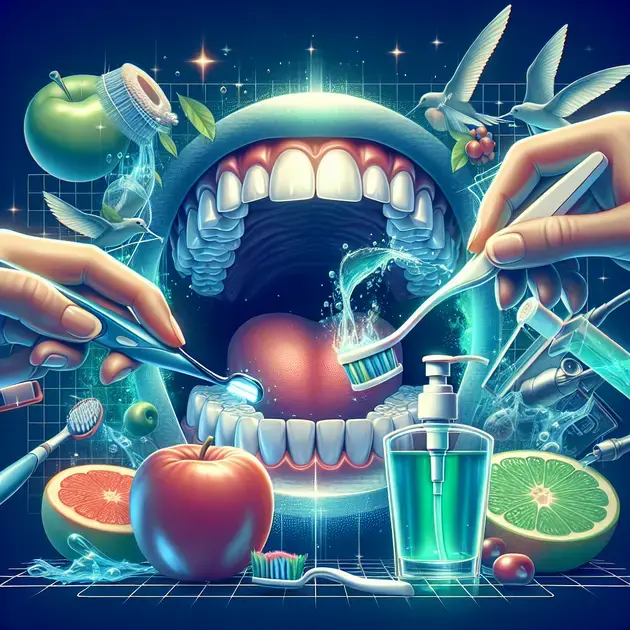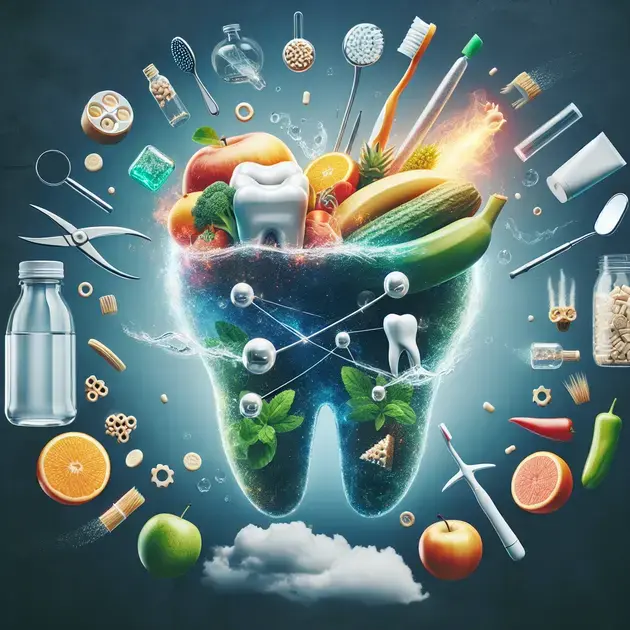Are you tired of dealing with horrible breath that just won’t go away? Look no further, as we’ve got you covered with some effective tips to combat this pesky problem. Bad breath, also known as halitosis, can be caused by a variety of factors such as poor oral hygiene, certain foods, or underlying health issues.
According to recent studies, about 30% of the global population experiences bad breath on a regular basis. This common issue can be embarrassing and have a negative impact on your confidence and social interactions. But fear not, with the right strategies and habits, you can say goodbye to bad breath and hello to fresh, minty breath.

Maintain Good Oral Hygiene Practices
Good oral hygiene is essential for combating horrible breath. To start, make sure you are brushing your teeth at least twice a day with a fluoride toothpaste. Additionally, don’t forget to floss daily to remove plaque and food particles between your teeth. Regularly using mouthwash can also help kill bacteria and freshen your breath.
Another important aspect of oral hygiene is visiting your dentist for regular check-ups and cleanings. Your dentist can detect any underlying issues that may be causing bad breath and provide appropriate treatment. They can also offer professional cleaning to remove stubborn plaque and tartar.
For a more thorough clean, consider investing in an electric toothbrush. Electric toothbrushes can be more effective at removing plaque and bacteria compared to manual toothbrushes. Some popular brands to consider are Oral-B and Sonicare, which offer a variety of models to suit your needs.
Lastly, don’t overlook the importance of cleaning your tongue. Use a tongue scraper or the back of your toothbrush to gently remove bacteria and food debris from the surface of your tongue. This simple step can make a significant difference in reducing bad breath.
By following these oral hygiene practices consistently, you can effectively combat horrible breath and maintain a fresh, clean mouth. Remember, good oral hygiene is key to overall oral health and confidence in your smile.
Watch What You Eat and Drink
The food and drinks you consume can have a significant impact on your breath. Certain foods like garlic, onions, and spicy dishes can leave a lingering odor in your mouth that contributes to bad breath. Avoiding these foods or brushing your teeth after consuming them can help alleviate the problem.
On the other hand, certain foods like fresh fruits and vegetables, particularly apples and carrots, can help clean your teeth and stimulate saliva production, which naturally washes away bacteria and food particles. Including these foods in your diet can be beneficial for keeping your breath fresh.
When it comes to drinks, water is your best friend for maintaining fresh breath. Staying hydrated throughout the day helps prevent dry mouth, which is a common cause of bad breath. Aim to drink at least 8 glasses of water a day to support saliva production and keep your mouth moist.
If you enjoy coffee or alcohol, be mindful that these beverages can contribute to bad breath. Limiting your consumption or using a straw to minimize contact with your teeth can help reduce their impact on your breath. Herbal teas, especially those containing mint or parsley, can be a refreshing alternative that also combat bad breath.
By being conscious of what you eat and drink, you can take proactive steps to combat bad breath and maintain a fresh mouth throughout the day. Making small adjustments to your diet and hydration habits can make a big difference in the overall freshness of your breath.
Stay Hydrated Throughout the Day
One of the simplest yet most effective ways to combat horrible breath is to stay hydrated. When you are dehydrated, your mouth produces less saliva, which is essential for washing away bacteria and food particles that can cause bad breath. Make it a habit to carry a reusable water bottle with you and sip on water throughout the day.
Aside from water, certain beverages like green tea and herbal infusions can also help freshen your breath. Green tea contains natural antioxidants that can help eliminate odor-causing compounds in your mouth, while herbal infusions like peppermint or chamomile have natural breath-freshening properties.
To track your daily water intake and ensure you are staying adequately hydrated, you can use hydration tracker apps like “WaterMinder” or “My Water & Drink Reminder.” These apps allow you to set personalized hydration goals, track your water consumption, and send reminders to keep you on track throughout the day.
In addition to increasing your water intake, you can also incorporate water-rich foods into your diet like cucumber, watermelon, and celery. These foods not only contribute to your overall hydration but also help cleanse your palate and promote saliva production for fresher breath.
By prioritizing hydration and making conscious efforts to drink an adequate amount of water throughout the day, you can significantly reduce the risk of bad breath and maintain a more pleasant oral environment. Remember, hydration is key to overall health and can have a positive impact on your breath freshness.

Preventive Measures for Bad Breath
Bad breath, also known as halitosis, can be a common and embarrassing problem for many people. It can be caused by various factors such as poor oral hygiene, certain foods, tobacco use, and underlying health conditions. Here are some preventive measures to help combat bad breath:
1. Maintain Good Oral Hygiene
One of the most important preventive measures for bad breath is to maintain good oral hygiene. This includes brushing your teeth at least twice a day, flossing daily, and using an antimicrobial mouthwash. Proper oral hygiene helps remove food particles and bacteria that can cause bad breath.
2. Stay Hydrated
Drinking an adequate amount of water throughout the day can help prevent bad breath. Saliva plays a crucial role in neutralizing acids and cleansing the mouth, so staying hydrated can promote saliva production and reduce the risk of bad breath.
3. Avoid Foods That Cause Bad Breath
Certain foods, such as garlic, onions, and spicy dishes, can contribute to bad breath. Limiting your consumption of these foods can help reduce the likelihood of developing halitosis. Opt for fresh fruits and vegetables that can naturally freshen your breath instead.
4. Quit Smoking
Tobacco use not only stains your teeth and increases the risk of oral cancer but also contributes to bad breath. Quitting smoking or using tobacco products can significantly improve your oral health and prevent bad breath.
5. Regular Dental Check-ups
Regular visits to the dentist are essential for maintaining good oral health and preventing bad breath. Your dentist can identify any underlying oral issues that may be causing halitosis and provide appropriate treatment.
The Impact of Lifestyle Choices on Oral Health
Our lifestyle choices can have a significant impact on our oral health. From the foods we eat to our daily habits, various factors can influence the health of our teeth and gums. Understanding the impact of lifestyle choices on oral health is crucial for maintaining a healthy smile:
1. Diet and Nutrition
The foods we consume can directly affect our oral health. A diet high in sugar and acidic foods can increase the risk of cavities and gum disease. On the other hand, a balanced diet rich in vitamins and minerals can promote strong teeth and healthy gums. Consuming too much vinhos mais caro do mundo can also lead to dental issues.
2. Oral Hygiene Practices
Consistent oral hygiene practices are essential for preventing oral health problems. Brushing and flossing regularly help remove plaque and bacteria that can cause cavities and gum disease. Using fluoride toothpaste and mouthwash can further protect your teeth from decay.
3. Stress Management
Chronic stress can have a negative impact on oral health. Stress can lead to teeth grinding, jaw clenching, and poor oral hygiene habits, all of which can contribute to dental issues. Finding healthy ways to manage stress, such as exercise or meditation, can help protect your oral health.
4. Tobacco and Alcohol Use
Smoking and excessive alcohol consumption are harmful to oral health. Both tobacco and alcohol can stain your teeth, increase the risk of gum disease, and contribute to bad breath. Quitting smoking and limiting vinhos mais caro do mundo can improve your oral health and overall well-being.
5. Regular Dental Visits
Scheduling regular dental check-ups is essential for maintaining good oral health. Your dentist can detect early signs of dental problems, provide professional cleanings, and offer advice on how to improve your oral hygiene routine. By prioritizing regular dental visits, you can prevent oral health issues and maintain a healthy smile.
Effective Habits for Fresh Breath
Having fresh breath is not only a sign of good oral hygiene but also boosts confidence in social interactions. By incorporating effective habits into your daily routine, you can enjoy long-lasting fresh breath. Here are some habits to help you maintain fresh breath:
1. Brush and Floss Regularly
Brushing your teeth twice a day and flossing daily are essential habits for fresh breath. These practices help remove plaque, food particles, and bacteria that can cause bad breath. Be thorough in your oral hygiene routine to ensure optimal freshness.
2. Clean Your Tongue
The surface of your tongue can harbor bacteria that contribute to bad breath. Use a tongue scraper or your toothbrush to gently clean your tongue after brushing your teeth. This simple habit can make a significant difference in keeping your breath fresh.
3. Stay Hydrated
Drinking an adequate amount of water throughout the day can help keep your mouth hydrated and prevent dry mouth, which can lead to bad breath. Hydration also promotes saliva production, which naturally cleanses the mouth and freshens breath.
4. Chew Sugar-Free Gum
Sugar-free gum can help stimulate saliva production, which can wash away food particles and bacteria in the mouth. Choose gum with xylitol, a sugar substitute that has been shown to reduce the risk of cavities and improve oral health.
5. Avoid Strong-Smelling Foods
Foods with strong odors, such as garlic and onions, can linger on your breath even after brushing. Avoiding these foods or rinsing your mouth with water after consuming them can help minimize their impact on your breath freshness.
Conclusion
Ensuring fresh breath and maintaining good oral health are essential for overall well-being. By implementing preventive measures such as maintaining good oral hygiene, staying hydrated, avoiding foods that cause bad breath, quitting smoking, and scheduling regular dental check-ups, individuals can combat halitosis effectively. Additionally, understanding how lifestyle choices impact oral health, including diet and nutrition, oral hygiene practices, stress management, and tobacco and alcohol use, is crucial for a healthy smile.
Consistent oral hygiene practices, such as brushing and flossing regularly, are key habits to prevent bad breath and dental issues. Proper stress management and limiting tobacco and alcohol consumption can contribute to better oral health and fresher breath. Incorporating effective habits like cleaning your tongue, staying hydrated, chewing sugar-free gum, and avoiding strong-smelling foods can further enhance breath freshness. By following these recommendations and prioritizing oral health, individuals can enjoy the benefits of a confident and healthy smile.
Overall, maintaining fresh breath goes beyond just brushing your teeth; it involves a holistic approach to oral care and lifestyle choices. With diligence and a commitment to good oral hygiene practices, individuals can tackle bad breath, prevent oral health issues, and boost their confidence in social interactions. Remember, a healthy smile and fresh breath are not only indicators of good oral health but also play a significant role in overall well-being and self-esteem.
